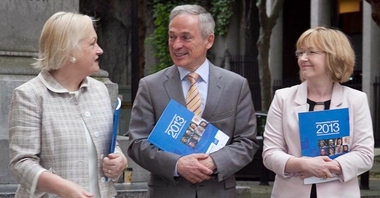
Pictured (l-r) are: Paula Fitzsimons, GEM Report co-author and national GEM coordinator, Minster for Jobs, Enterprise and Innovation Richard Bruton TD, and Theresa Keady, EC Charging.
The Minister for Jobs, Enterprise and Innovation, Richard Bruton TD launched the Global Entrepreneurship Monitor (GEM) Report for Ireland for 2013. The Report shows that 32,000 people started new businesses in Ireland in 2013, and that one in eleven of the adult population are engaged in some form of early stage entrepreneurial activity.
Findings of the 2013 GEM research also show that the rate of early stage entrepreneurial activity is at its highest since the onset of the economic crisis. The pipeline of future entrepreneurs also looks very strong as those indicating that they intend to start a business in the next three years increased significantly in 2013 and is now at its highest level since Ireland first became involved in GEM research in 2000.
The GEM report is supported by Enterprise Ireland, Forfás and the Department of Jobs, Enterprise and Innovation. The authors of the report are Paula Fitzsimons of Fitzsimons Consulting, who is the National GEM Co-ordinator, and Dr Colm O’Gorman, Professor of Entrepreneurship, DCU Business School.
Other findings include:
There was an increase in the rate of Total Early Stage Entrepreneurial Activity (TEA) in Ireland in 2013 – 9.2% up from 6.1% in 2012. Ireland is now ranked 2nd across the EU-15 and 9th among the EU-28 countries
One in eleven of the adult population in Ireland are engaged in some aspect of early stage entrepreneurial activity.
The gender gap has narrowed and not because less men were early stage entrepreneurs (as was the case in 2012): In terms of new business owners the gender ratio is 1.4:1 In terms of total early stage entrepreneurs it is 1.9:1.
There had been a serious concern about the pipeline of entrepreneurs for the future. (This was reflected in the Report of the Entrepreneurship Forum). This was turned around in 2013 with 14.7% of the population indicating their intention to set up a new business in the next three years. This is higher than EU 15 average (11.5%) but somewhat behind EU-28 (15.9%).
Early stage entrepreneurship is higher among immigrant groups (11%) than it is among the non-immigrant population (8.8%).
The majority of early stage entrepreneurs expect to become employers (85%). The number of early stage entrepreneurs that have ambitious growth aspirations and expect to employ 10 or more after five years (22%), compares very favourably with international averages.
13% of early stage entrepreneurs have, or expect to have, 75% or more of their customers in overseas markets. This is the 4th highest rate for significant exporters across the OECD.
Irish early stage entrepreneurs are relatively innovative with 27% of their products/services considered new to all customers compared to their international counterparts, 17% (OECD), 16% (EU-28) and 18% (EU-15).
Four out of five adults in Ireland have a high regard for successful entrepreneurs (81%). The rate is second only to Finland (85%) across all EU and OECD countries in this respect.
The level of perception of supportive media coverage about entrepreneurs in Ireland (60%) remains higher that the international averages across the OECD (51%), EU-28 (49%) and EU-15 (49%).
The rate at which individuals are turning to entrepreneurship out of necessity continued a downward trend (19% from 28% in 2012). This rate is lower than the international averages across the OECD (21%) and EU-28 (24%) and broadly similar to the EU-15 (18%).
The rate of owner managers of established business is now at its lowest rate since 2004 when it was 6.5%. The rate in 2013 (7.5%), however, remains higher than the average across the OECD (6.6%), the EU-28 (6.4%) and EU-15 (6.6%).
The rate at which entrepreneurs were discontinuing their business increased slightly in 2013. This increased from 1.2% in 2012 to 1.9% in 2013. This rate is on par with the averages across the OECD (2.1%), EU-28 (2%) and EU-15 (1.7%).
The majority of entrepreneurs that closed their business cited that the business was not profitable as their reason for doing so (59%). 10% claimed to have problems getting finance in order to keep the business going.
Informal investors are a vital source of funding for new businesses in Ireland. There was little change in the number of adults reported having provided funds in the past three years (June 2010 to June 2013) to a business started by someone else (3.4%). The average amount invested by individuals in Ireland (€18,700) during this period was relatively low in comparison to the OECD average (€23,000).